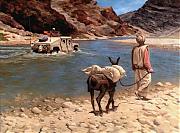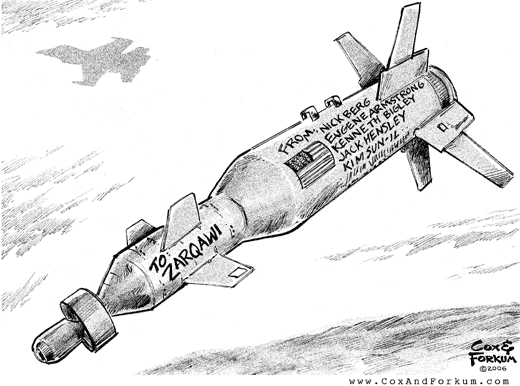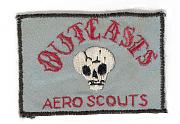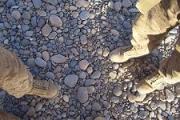...
We're winning.
Yeah, the good guys. Our troops. And the Iraqi army. We're winning. We were winning big even before we nailed Zarqawi. The terrorists themselves said so. In their state-of-the-troubled-union message to themselves.
According to al Qaeda in Iraq, critics of "stay the course" need to stick it where the sun don't shine: One key captured document states that "time is beginning to be of service to the American forces."
Guess we ought to pull our troops out now. Right, Nancy? Howard? Teddy? John?
And that's just a fraction of the good news that was plaguing the masters of terror. Zarqawi's inner circle had concluded that:
* The Iraqi military and security forces had become painfully effective, paralyzing terrorist efforts in parts of Iraq where they'd previously moved freely.
* Losses due to U.S. and Iraqi strikes had badly sapped terrorist strength - and they were having grave difficulty gathering new recruits. Guess not everybody wants a Saturday-nighter with the virgins of paradise.
* While elements in our own media continued to claim that the terrorists couldn't be defeated, the terrorists themselves felt that the Iraqi media's reporting on terrorist atrocities had badly undercut their base of support.
* The terrorists were suffering from the loss of financial resources, as well as a shortage of weapons - old allies were bailing out on them, while their dwindling assets were being seized by Coalition and Iraqi-government forces.
* In the terrorists' view, regional and world opinion had moved behind the Coalition and the elected Iraqi government.
Desperate, Zarqawi's butchers laid out a program to try to regain the initiative they'd lost. Here's what the terrorists hoped to do:
* In their own words, "use the media for spreading an effective and creative image of the resistance." That is, exploit the prejudices of the Western media, the terrorists' last allies.
* Infiltrate Iraq's army, which was pinning them to the mat (if you can't beat 'em, join 'em).
* Unify the resistance - which was falling to pieces amid squabbles over tactics, over turf and even over who was the real enemy.
* Most ambitious, the terrorists hoped to spark a war between the United States and Iran, to "create a second front" that would take pressure off them. To that end, they planned to implicate Iran in staged terrorist events and to provide disinformation about Tehran's having ties to terrorist groups targeted by the United States.
* Just in case that didn't work, the terrorists also hoped to ignite civil wars between Sunni and Shia, Americans and Shia, Shia and Shia, Kurds and Shia - and even between different Sunni factions. A Vietnam-era U.S. officer was ridiculed for saying, "We had to destroy the village in order to save it," but al Qaeda is willing to destroy all of Iraq in order to save it for a fanatical vision...




 past tense of course in his case being a good thing!
past tense of course in his case being a good thing!







Bookmarks